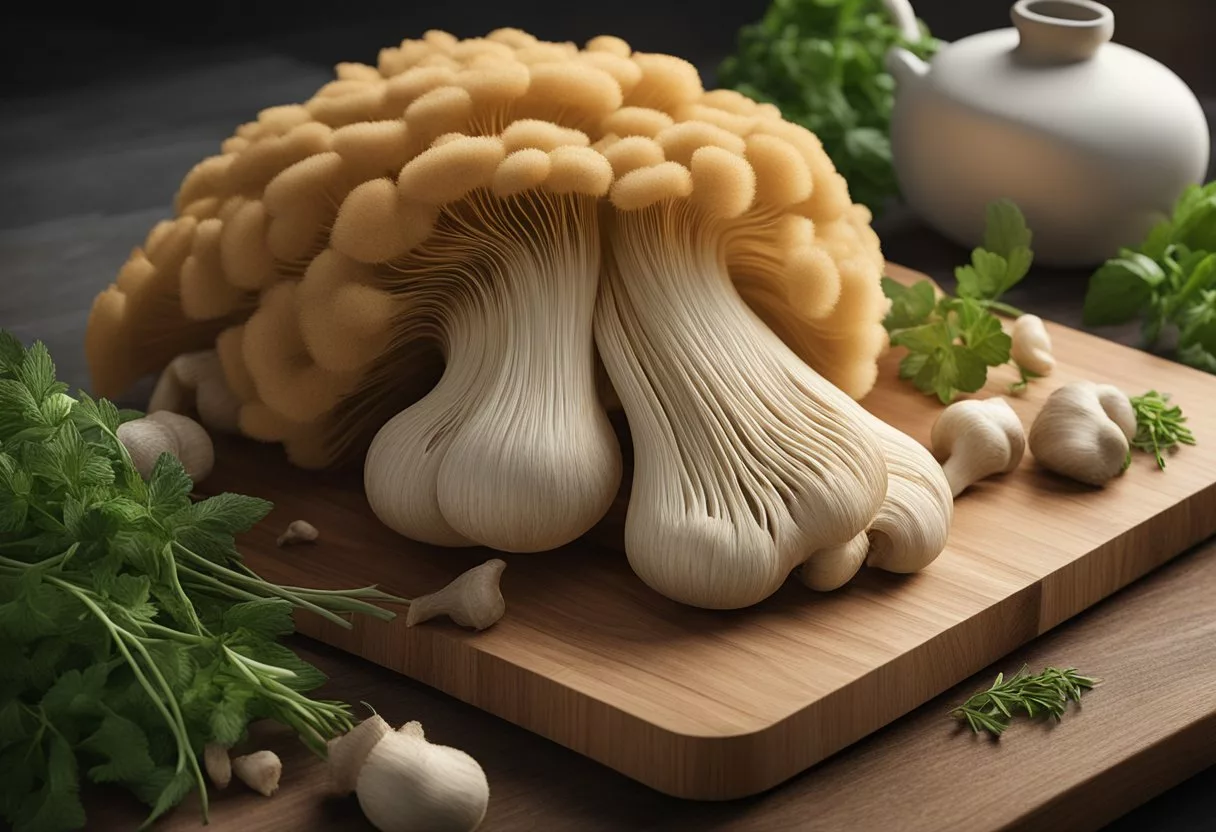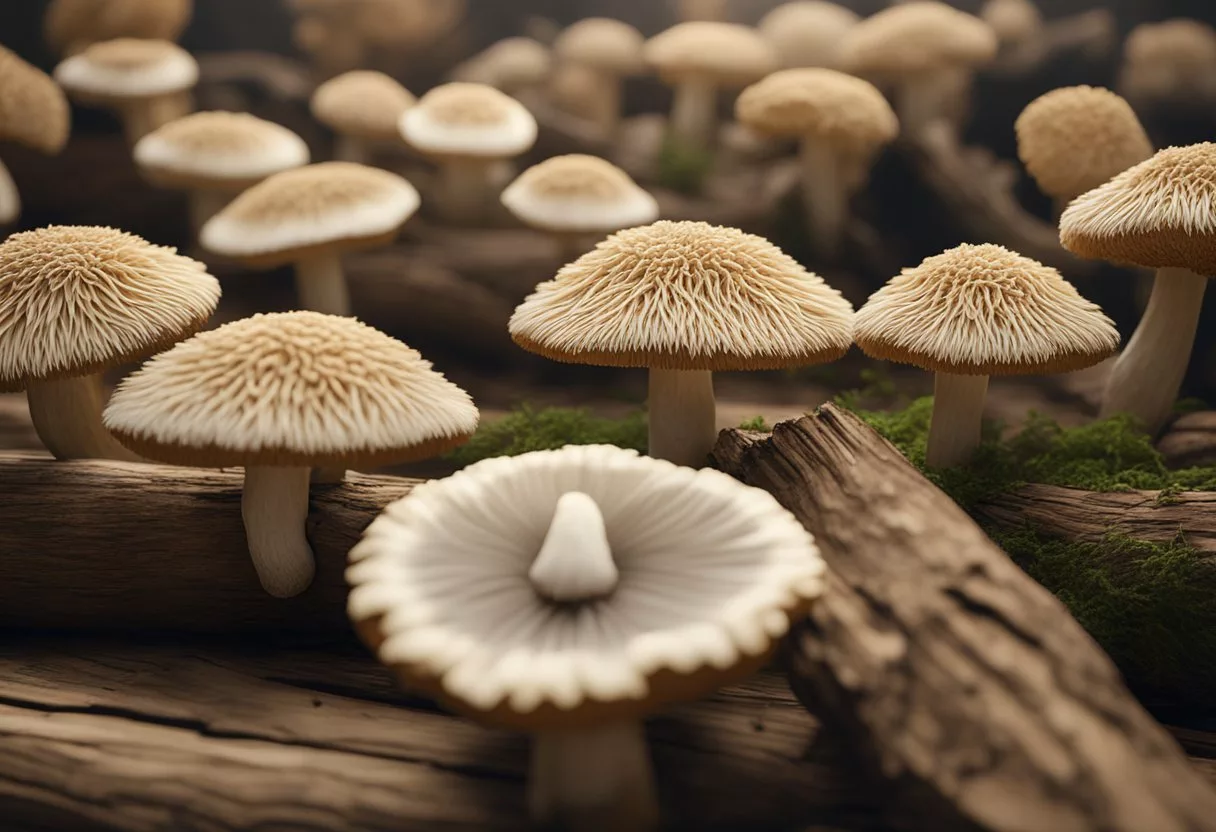Lion’s Mane Mushrooms, scientifically known as Hericium erinaceus, are unique fungi. They are distinguished by their long, shaggy spines resembling the mane of a lion. Traditional to the forested regions of Asia, these mushrooms have garnered respect not only for their distinctive appearance but also for their myriad of culinary and medicinal applications.
While these mushrooms have been a staple in Asian cuisines for centuries, their popularity in Western countries has surged due to both their versatility in dishes and their health-promoting properties. They contain bioactive substances that may support brain health, improve cognitive function, and protect against diseases.
This has propelled Lion’s Mane into the spotlight for both nutrition enthusiasts and scientific researchers interested in its potential therapeutic effects. Cultivation techniques for Lion’s Mane have also evolved, making these mushrooms more accessible to consumers around the world.
Key Takeaways
- Lion’s Mane is a mushroom notable for its unique appearance and medicinal properties.
- It is used in various cuisines and studied for potential brain health benefits.
- The mushroom is cultivated globally and continues to be a subject of scientific research.
Identification and Classification

Identifying Lion’s Mane Mushrooms is critical due to their unique medicinal properties and resemblance to other species. Classification helps differentiate them from similar fungi.
Species Overview
Lion’s Mane Mushroom, also known as Hericium Erinaceus, Bearded Tooth Fungus, Bearded Hedgehog, and by its Japanese name, Yamabushitake, is a distinctive fungus. It’s recognized for its long, shaggy spines that hang down like a cascade, reminiscent of a lion’s mane. These mushrooms can vary in color, typically white when young and becoming yellowish or brown as they age.
The fruiting body of the Lion’s Mane Mushroom commonly grows on both living and dead broadleaf trees. It is known for its larger size that may range from 2 to 10 inches across, sometimes growing even larger under ideal conditions.
Taxonomy and Nomenclature
Taxonomically, Hericium Erinaceus belongs to the kingdom Fungi, class Agaricomycetes, order Russulales, family Hericiaceae, and genus Hericium. The genus Hericium includes several species, but Erinaceus is distinguished by its single, unbranched body from which spines descend.
In nomenclature, the common name “Lion’s Mane” conveys the fungus’s physical resemblance to the majestic animal, while “Bearded Tooth” and “Bearded Hedgehog” refer to its tooth-like spines and hedgehog-like appearance, respectively. Yamabushitake translates to “those who sleep in mountains”, a moniker that speaks to its traditional use by monks to enhance brain function and promote longevity.
Nutritional Profile and Health Benefits

Lion’s Mane mushrooms are renowned for their unique nutritional composition and diverse health benefits. They are a rich source of proteins, antioxidants, and several essential vitamins and minerals which contribute to their therapeutic effects on health.
Nutritional Content
Lion’s Mane mushrooms offer a notable nutritional boost. They are low in calories but high in fiber and protein, which makes them a beneficial food for managing weight and supporting muscle growth. One study shows that a 100-gram serving contains roughly 2.5 grams of protein. Besides protein, these fungi are also a source of important vitamins, such as B-vitamins including niacin, as well as minerals like potassium, which is essential for cardiovascular health and fluid balance.
Medicinal Properties
Lion’s Mane mushrooms contain potent bioactive substances, hericenones and erinacines. These compounds have been found to support nerve growth and may embody neuroprotective properties. Studies suggest that they can potentially aid in the recovery from nerve damage and may play a role in preventing diseases such as dementia.
Therapeutic Effects on Cognitive Health
There’s growing evidence to support the use of Lion’s Mane mushrooms in improving cognitive health. Notably, their consumption has been associated with a reduction in mild cognitive impairment, a precursor to conditions like Alzheimer’s. Due to their influence on nerve growth factor, they may help in the improvement and maintenance of cognitive functions.
Potential in Cancer Therapy
Ongoing research indicates that certain extracts of Lion’s Mane mushrooms may possess anti-cancer abilities. Some studies reveal that these fungi could inhibit the growth of cancer cells and can be considered a complementary approach alongside traditional cancer treatments. They also promote overall body immune responses and are associated with lowering the risk of serious health conditions including heart disease and diabetes.
Biological Mechanisms of Action

Lion’s Mane Mushroom has gained interest in scientific circles due to its potential impact on neural health, primarily through biologically active compounds that can stimulate nerve growth factor production and exhibit neuroprotective effects.
Nerve Growth Factor (NGF) Stimulation
Lion’s Mane Mushroom contains compounds such as hericenones and erinacines that can stimulate the production of Nerve Growth Factor (NGF). NGF is a protein crucial for the growth, maintenance, and survival of nerve cells, which is vital for cognitive function and the prevention of cognitive impairment.
Nerve Cell Regeneration
Research suggests that Lion’s Mane supports nerve cell regeneration. This activity is attributed to the mushroom’s ability to enhance NGF synthesis, which promotes the repair and regeneration of neurons, potentially aiding in recovery from nervous system injuries.
Anti-Inflammatory Effects
Lion’s Mane exhibits anti-inflammatory effects on the body. Inflammation is a common response to various injuries or diseases and can impact the nervous system. By reducing inflammation, it may contribute to the alleviation of cognitive decline.
Immune System Enhancement
The bioactive components in Lion’s Mane also bolster the immune system. A strong immune system is essential for overall health, including the ability to protect against neurodegenerative conditions, thus indirectly supporting cognitive health and possessing neuroprotective effects.
Cultivation and Harvesting Techniques
In this section, we will discuss the specific methods used to cultivate Lion’s Mane mushrooms, the conditions that foster their growth, and the techniques for foraging these unique fungi.

Cultivation Methods
Cultivating Lion’s Mane mushrooms begins with spore inoculation or the use of cultures to start the growth process. Growers may choose one of several mediums for cultivation, such as hardwoods like maple or oaks, which are the mushrooms’ natural growing environment. Alternatively, they can use supplemented sawdust blocks or bags specially formulated with nutrients to simulate the hardwood environment.
- Spore inoculation involves spreading spores onto a substrate, such as sterilized grains.
- Culture-based cultivation uses pre-colonized materials, like grain spawn or liquid cultures, which can be obtained from reliable suppliers.
Precision is crucial; from sterilization to incubation, every step is monitored to ensure successful colonization and growth.
Optimal Growing Conditions
The health and productivity of Lion’s Mane mushrooms rely heavily on providing the optimal growing conditions which include:
- Temperature: Ideal ranges are between 18°C to 24°C (64°F to 75°F).
- Humidity: A high humidity level, preferably between 85-95%, is essential during the fruiting phase.
- Light: Indirect light helps with the development of robust mushrooms, simulating the under-canopy environment of their natural habitat.
Attention to these environmental factors will result in higher yields and more substantial mushroom body formation.
Foraging Tips
When foraging for Lion’s Mane mushrooms in the wild, identifying the correct habitat is critical. They are often found on hardwoods such as dead or dying trees and stumps, notably favoring maple and oaks. Look for the distinctive white, icicle-like tendrils:
- Lion’s Mane tends to grow in cooler seasons, so autumn is an ideal time.
- Sourcing from well-shaded areas that mimic the mushrooms’ natural, low-light habitat can yield better results.
Foragers must always use clean hands or a sterilized knife to harvest the mushrooms, aiming to minimize damage to both the fungus and its host tree. Remember, responsible foraging includes leaving enough mushrooms for re-spawning and avoiding over-harvesting.
Usage in Cuisine and Supplements

Lion’s Mane mushrooms are versatile in culinary applications and widely consumed in supplement form for potential health benefits. They can be found fresh for cooking or processed into extracts and powders for dietary supplements.
Edible Mushroom Preparations
In the realm of food, Lion’s Mane mushrooms are a delicacy akin to lobster, with a similarly meaty texture and subtle seafood-like flavor. They are ideal for cooking in a variety of dishes, ranging from simple sautés to intricate gourmet meals. Fresh Lion’s Mane can be foraged in the wild or purchased at specialty markets, often used in soups, stir-fries, and as a meat substitute.
Extraction and Supplement Forms
Beyond the kitchen, Lion’s Mane is transformed into several supplement forms, including powders, capsules, and tinctures. These processed forms are derived from both the fruiting body and the mycelium, offering a concentrated source of the mushroom’s bioactive compounds. Liquid extracts are also available and can be added to drinks for ease of consumption.
Dosage and Consumption Recommendations
When considering dosages of Lion’s Mane supplements, it’s crucial to follow manufacturer recommendations or consult a healthcare provider. The appropriate intake can vary between individuals.
Capsules might offer a convenient, predetermined measure, whereas powders and tinctures allow for more flexibility in adjusting the amount. Dietary supplements should not replace a balanced diet but can complement it.
Cultural and Historical Significance

Lion’s Mane mushrooms, long revered in several Asian countries, hold a prominent place in the realms of traditional medicine and culinary arts. Their use in these domains has been chronicled throughout history, particularly within China and Japan.
Traditional Chinese Medicine
In China, Lion’s Mane mushrooms (Hericium erinaceus) are deeply embedded within Traditional Chinese Medicine (TCM). They are lauded for their purported ability to boost cognitive function and nerve health.
Ancient texts often referred to it as a tonic for enhancing focus and restoring balance in the body. These mushrooms were also traditionally used by Yamabushi mountain monks to enhance meditation and concentration during their spiritual practices.
Use in Asian Cuisines
Lion’s Mane mushrooms are not only pivotal in the sphere of Chinese medicine but also in the domain of Asian Cuisines.
In Japan and China, these mushrooms are a gourmet delicacy, known for their seafood-like flavor when cooked. Utilized in a variety of dishes, Lion’s Mane mushrooms have been adding nuanced flavors to Asian kitchens for centuries.
They’re often found in vegetarian dishes, playing a substantial role as a meat substitute due to their substantial and tender texture.
Safety and Side Effects

Lion’s Mane Mushrooms are recognized for their potential health benefits, but safety and side effects are important considerations. Consumers should be aware of possible adverse reactions and interactions with other substances.
Potential Adverse Effects
Lion’s Mane Mushrooms can cause mild side effects. Most commonly, these include stomach discomfort and digestive issues when ingested orally.
Specifically, there is evidence suggesting that Lion’s Mane may protect against ulcers in the digestive tract, but this does not preclude them from causing gastrointestinal upset in some individuals.
Interactions and Contraindications
While research is ongoing, there are currently no well-documented drug interactions or contraindications with Lion’s Mane Mushroom.
However, individuals should be cautious if they have known allergies to mushrooms, as adverse effects related to immune responses might occur.
As with introducing any new supplement, it’s recommended to consult with a healthcare professional, especially for those with pre-existing conditions or those taking other medications.
Conservation and Environmental Impact

Lion’s Mane mushrooms have a significant role in both cultivated and wild environments. The conservation of these fungi and their environmental impact revolve around sustainable practices and the preservation of their natural habitats.
Sustainability of Cultivation
Cultivation of Lion’s Mane mushrooms, as saprotrophic organisms, involves the decomposition of organic matter for growth.
This process is generally sustainable, as it can utilize agricultural byproducts such as sawdust or grain, transforming waste into valuable nutrition.
The ecological footprint of cultivating Lion’s Mane in controlled environments is low compared to other food products. This is due to the recycling of substrates and the avoidance of pesticides and fertilizers typically required for crop farming.
Wild Populations and Preservation
Lion’s Mane mushrooms found in North America and Europe grow on dead or dying hardwood trees. They act as natural decomposers, which is critical for forest ecosystems.
However, they can be threatened by logging and land use changes.
Preservation of these wild populations involves protecting the forests and deadwood on which they thrive.
As neither a parasite nor harmful to its host trees, Lion’s Mane helps maintain ecological balance. Conservation efforts prioritize the maintenance of their natural habitats to ensure they can continue their role in the ecosystem.
Future Research and Potential

Lion’s Mane Mushrooms have shown potential benefits across various health-related areas, sparking interest for deeper investigation into their therapeutic applications and cultivation advancements.
Emerging Therapeutic Applications
Recent studies have highlighted Lion’s Mane Mushroom’s ability to stimulate the production of brain cells and potentially enhance memory.
This points to prospective benefits for conditions involving the nervous system, such as aiding nerve regeneration and possibly providing alternatives for the recovery from nerve injuries.
The role of Lion’s Mane in possibly mitigating the effects of stroke by protecting blood vessels against oxidative stress also warrants further exploration.
In addition to neural benefits, emerging research suggests that Lion’s Mane could play a role in managing cholesterol levels and supporting blood sugar control, which is significant for managing diabetes.
Its potential to inhibit the growth of cancer cells and combat H. Pylori infections opens another avenue for research into its use as a complementary therapeutic strategy.
Advancements in Cultivation Technology
With increasing interest in Lion’s Mane as a health food, advancements in cultivation technology are critical to meet demand.
Enhancements in the production of mycelium — the vegetative part of the mushroom — could increase yield and potency.
Innovative cultivation methods could also improve the consistency and concentration of bioactive compounds, which are crucial for Lion’s Mane’s therapeutic effects.
Researchers are keen on optimizing conditions that could favor higher quality and quantity yields. This could ultimately make these mushrooms more accessible through health food stores.
By refining these techniques, the potential health benefits of Lion’s Mane could become more widely available to consumers interested in natural options to support cognitive function, focus, and overall neurological health.
Frequently Asked Questions

Lion’s Mane mushrooms have gained attention for their potential health benefits and uses in culinary and medicinal fields. Readers often have questions regarding their effects and safety.
What are the potential benefits of taking Lion’s Mane mushrooms?
Lion’s Mane mushrooms are said to offer a range of health benefits, including cognitive enhancement and nerve growth support. Some studies suggest they may help improve memory and concentration.
Are there any side effects associated with Lion’s Mane supplements?
While generally considered safe, some individuals may experience digestive discomfort or potential allergic reactions from Lion’s Mane supplements. It’s crucial to consult with a healthcare provider before starting any new supplement regimen.
How can Lion’s Mane consumption impact men’s health?
They may benefit men’s health by potentially supporting nerve regeneration and cognitive function. Research specific to men’s health is limited, so more studies are necessary to draw definitive conclusions.
What spiritual or cognitive effects are attributed to Lion’s Mane mushrooms?
Lion’s Mane mushrooms have a traditional use in enhancing focus and supporting overall brain health. Anecdotal evidence suggests they may also support a sense of well-being and mindfulness, although these effects are not yet scientifically verified.
Can Lion’s Mane mushrooms affect women’s health differently than men’s?
There is no specific research indicating a difference in effects between men and women. Benefits like promoting neurological health are thought to be universal, though individual experiences can vary.
How often is it safe to consume Lion’s Mane mushrooms?
Intake frequency should be based on the dosage guidelines of the product’s label or a healthcare provider’s recommendation.
Lion’s Mane mushrooms can typically be consumed daily as a food or supplement.